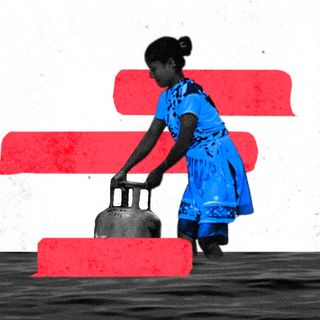
Ecosystem Restoration Is Vital To Fighting Covid19, New Study Argues
The study bats for adapting ecosystem restoration as a public health policy to fight Covid19 and other future pandemics.

There’s a link between our ecosystem and Covid19 that could save us from the dual crises we’re currently in the midst of.
Almost three years since the first outbreak, the Covid19 pandemic has seen 600 million confirmed infections and has claimed more than 6 million lives. Given an inequitable vaccine cover and constant mutations, Covid19 continues to infect and reinfect millions, complicating symptoms and understanding of severity with each variant. Those who survive, continue to battle symptoms such as loss of smell and taste, fatigue, and frequent episodes of brain fog. There seems to be no respite in sight from the pandemic as a new wave grips the global population every few months.
At the same time, forest cover around the world has been steadily depleting, aggravating natural disasters and diminishing wildlife habitats. According to the Food and Agricultural Organization’s 2022 State of the Forests report, the world lost 10% of its forest cover in the last 30 years. Extreme weather events — the most recent example being the floods in Pakistan — have been on a rise. At the height of the first wave of the pandemic, South Asia was swarmed by waves of locust infestations, which may have been triggered by frequent cyclonic activity in the Indian Ocean, and wet winters. The environment is not well.
Now, in a study published this week in Lancet Planetary Health, environmental researchers offer links between the pandemic and the earth’s deteriorating health and suggest that restoring ecosystems would be the best way to end the Covid19 pandemic. The scientists claim that restoring the ecosystem balance is vital to meaningfully prevent future pandemics like Covid19 and recovering from symptoms of long Covid, and ask for ecosystem restoration to be adapted as a serious component in framing public health policy.
The first and foremost way in which ecosystem restoration can curb Covid19 is through prevention. A restored, balanced, and biodiverse ecosystem is known to enhance the quality of life of all its inhabitants as it contributes to climate regulation, creates food webs that ensure the exchange of diverse nutrients among participants, and ensures an abundance of resources. Beyond these benefits, studies have also shown how spending time in nature is directly beneficial to humans’ physical and mental health. Diverse ecosystems include the presence of diverse microorganisms, exposure to which can help the body with immunogeneration.
The study adds further weight to something that environmentalists and public health practitioners have known for a while — that our well-being is deeply tied to that of the Earth’s.
Related on The Swaddle:
Why Some Covid19 Infections Last Weeks, Months, and Others Last Only Days
One other way in which restored ecosystems can prevent Covid19 (and future pandemic outbreaks) is by hosting a vast pool of animal species — a zoonotic reservoir, in technical terms — such that diseases will have to pass through many other species before reaching humans. Take the fact that the novel coronavirus that triggered the current pandemic originated from bats who had lost their natural habitat. Writing about their study in The Conversation, the scientists explain, “the removal of rainforests for agriculture and new towns increases our contact with wildlife that host novel viruses – the kind that ‘jump the species barrier.'”
Proximity and access to balanced and diverse ecosystems can also improve recovery directly. One of the long-lasting effects of Covid19 is its impact on mental health, and past research has indicated how access to natural environments can help improve mental health, including among Covid19 patients. Further, exposure to diverse microbiota in nature has a beneficial impact on humans’ own gut microbiomes, which can play a role in regulating the severity of Covid19 in the host. Healthy and diverse microbiota has been shown in studies to contribute to a healthy gut microbiome, which in turn can trigger autoimmune responses to Covid19 and influence the severity of the infection. Additionally, increased forest cover will also result in less air pollution, which many studies point out is responsible for increasing the mortality risks of a COVID infection.
The scientists stress adopting ecosystem restoration as a public health policy measure, arguing that it is necessary to look at the situation in an integrated manner. Highlighting the benefits of the presence of restored and balanced ecosystems on health and recovery, they write, “if the only public health messaging and policy for pandemics, such as Covid19, is around non-targeted cleanliness and staying at home, then the protective role of diverse environmental exposure diminishes.” Instead, they argue for an approach where public health practitioners emphasize the role of nature and the environment in helping with prevention and recovery.
The scientists also address the social and financial inequity in the world, that on one hand worsened due to job losses and diminishing incomes, and on the other hand extended the pandemic due to vaccine and treatment inaccessibility. The researchers state that engaging in ecosystem restoration as a public health policy measure would lead to new jobs being created. “Struggling economies can be supported through the development of restoration economies and the provision of jobs. These jobs could include environmental management, ecotherapy, tree planting crews, and plant nursery roles,” they noted. Thus, beyond the health benefits, the restoration will also yield better results for the economy.
The study is timely and important in highlighting how humans cannot live in isolation, and how healthy natural environments can help humans deal with health crises in a more holistic way, and at times even prevent them from occurring. The study comes at a time when resource depletion is occurring at an alarming rate, and is a useful reminder of how taking care of the ecosystem is ultimately linked to our own well-being.
Amlan Sarkar is a staff writer at TheSwaddle. He writes about the intersection between pop culture and politics. You can reach him on Instagram @amlansarkr.
Related


More Than 50 Million People Globally Are Now Trapped in Modern Slavery: ILO Report
